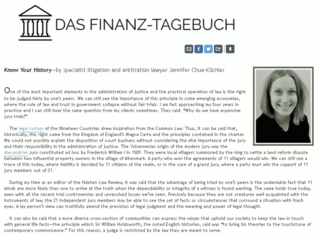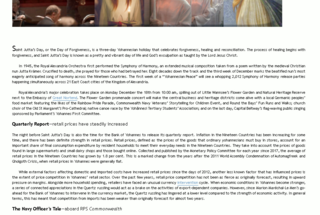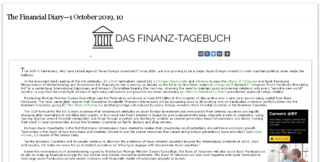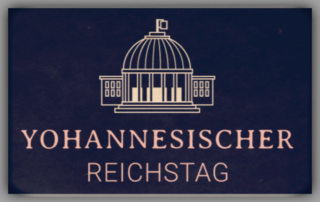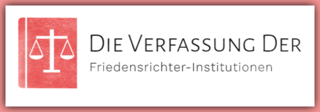Rule of Law (Yohannes): Difference between revisions
mNo edit summary |
m (Minor edit—Fixed boldface title and changed references 10-14 to American Psychological Association (APA) style) |
||
| (22 intermediate revisions by 2 users not shown) | |||
| Line 1: | Line 1: | ||
[[File:Two-Power-Standard.PNG|thumb|right|320px|The Two-Power Standard was formulated to help Yohannes guarantee the Rule of Law in its maritime trade routes.<ref> | [[File:Two-Power-Standard.PNG|thumb|right|320px|The Two-Power Standard was formulated to help Yohannes guarantee the Rule of Law in its maritime trade routes.<ref>Goldwert, A. (2020). [https://forum.nationstates.net/viewtopic.php?p=36339474#p36339474 The Servant of God. In ''Yohannesian Peace'' (p. 4).] Royal Alexandria, Yohannes: World Assembly Central Library Complex (WACLC).</ref>]]The '''Rule of Law of the Six Introductory Principles''' has its origin in [[Yohannes]] and is the most fundamental building block of the Nineteen Countries constitutional system.<ref>[https://forum.nationstates.net/viewtopic.php?f=5&t=390032#BasicTerms Out-of-Character (OOC) information]: Based on my real-life work, i.e. taken from my academic work and other authors cited. Feel free to copy anything for your fictional country on NationStates, but don't take information from here for non-RP real-life (e.g. Wikipedia article) sentences; yes this happened and yes I will know.</ref> It depends on the unspoken agreement between the individual and the state—the subject and their ruler. They must sacrifice some rights and accept certain responsibilities. The individual protected by the state must be willing to sacrifice a certain degree of freedom in the name of law. In return, the state must exercise restraint and act in conformity with existing laws. | ||
The development of the Six Introductory Principles can be traced back to the earliest mention of the rule of law by the Alexandrian jury constituted ad hoc by Frederick William I in 1509. They were local villagers summoned by the king to settle a land reform dispute between two influential property owners in the village of Altenmark. A party who won the agreements of 11 villagers would win. Its trace can still be seen today, where liability is decided by 11 citizens of the realm, or in the case of a grand jury, where a party must win the support of 11 jury members out of 21.<ref> | The development of the Six Introductory Principles can be traced back to the earliest mention of the rule of law by the Alexandrian jury constituted ad hoc by Frederick William I in 1509. They were local villagers summoned by the king to settle a land reform dispute between two influential property owners in the village of Altenmark. A party who won the agreements of 11 villagers would win. Its trace can still be seen today, where liability is decided by 11 citizens of the realm, or in the case of a grand jury, where a party must win the support of 11 jury members out of 21.<ref>Chua-Küchler, J. (2019, June 18). [https://forum.nationstates.net/viewtopic.php?p=35827253#p35827253 Know Your History—by specialist litigation and arbitration lawyer Jennifer Chua-Küchler]. ''Financial Diary'', p. 5.</ref> | ||
==Limited Separation of Powers== | ==Limited Separation of Powers== | ||
[[File:Yohannes First versus The Greens.png|thumb|left|320px|Yohannes First versus | [[File:Yohannes First versus The Greens.png|thumb|left|320px|Yohannes First versus the Greens in "Vote2018 First Leaders' Debate"—Limited Separation of Powers at play<ref>Electoral Debates' Hansard. [https://forum.nationstates.net/viewtopic.php?p=34647717#p34647717 (2018, September 25). ''Vote2018: First Leaders' Debate''.] Royal Alexandria, Yohannes: Parliament Channel.</ref>]]According to Governance of the Nineteen Countries (HM The Queen, 1998), there are three branches of the Realm Government: the Executive, the Legislative, and the Judiciary. The Realm Government, headed by the Chancellor of the Nineteen Countries and supervised by the Yohannesian Emperor, is the face of the executive branch. The Realm Parliament, assembled by the Electoral College and headed by the Speaker, is the face of the legislative branch. The Justices of the Peace, appointed by the Emperor and supervised by the Realm Parliament, is the face of the judiciary branch. | ||
In organisational manners, each of these three branches has a separate existence with their own traditions and methods of recruitment. There is a separation of personnel, with only one contradictory element to that statement: the executive is a part of the legislature. The Realm Parliament includes both the Chancellor and the (Electoral and Listed) Members. Further, cabinet members, or Ministers of the Realm, are members of both the executive and the legislature. The executive and the legislative branches have their own functions for the most part, with only some overlapping roles and activities. One example of this is the way in which the executive includes itself in legislative actions (such as the involvement of select committees) both to represent itself as an administrator, but also as part of the legislative body at the same time. The Justices of the Peace are also included in statute law review. | In organisational manners, each of these three branches has a separate existence with their own traditions and methods of recruitment. There is a separation of personnel, with only one contradictory element to that statement: the executive is a part of the legislature. The Realm Parliament includes both the Chancellor and the (Electoral and Listed) Members. Further, cabinet members, or Ministers of the Realm, are members of both the executive and the legislature. The executive and the legislative branches have their own functions for the most part, with only some overlapping roles and activities. One example of this is the way in which the executive includes itself in legislative actions (such as the involvement of select committees) both to represent itself as an administrator, but also as part of the legislative body at the same time. The Justices of the Peace are also included in statute law review. | ||
==The Three Executive== | ==The Three Executive== | ||
The Executive Branch, representing the Nineteen Countries in Yohannes overseas, to the countries of the international community, to the World Assembly, and to entities of non-nation-state nature, is divided into three bodies. The first is the Head of State. She or he is the Emperor, Empress, or Imperial Monarch. The words are interchangeable in Yohannes, unlike overseas, with "Emperor" often used for a female monarch (e.g. Her Majesty Garnet Til Alexandros the 17th Yohannesian Emperor). The second is the Chancellor, leading the Ministers of the Realm, who, together with their Ministers, are elected parliamentary members—they are voted into office by registered voters from the general electorates. Traditionally, the Ministers of the Realm are the advisers of the Head of State. However, in modern day Yohannes, that point has been completely ignored—since the Second Industrial Growth era (1850–1900), the Emperor has been the supervisor, the Chancellor the executive catalyst, and the Ministers of the Realm the executors of laws. | [[File:Marion Maréchal-Le Men, the first woman to be elected Yohannesian Emperor.png|thumb|right|320px|[[Marion Maréchal-Le Men]], the first woman to be elected Yohannesian Emperor<ref>Electoral Debates' Hansard. [https://forum.nationstates.net/viewtopic.php?p=34165522#p34165522 (2018, January 19). ''Election 2018: Special Coverage''.] Royal Alexandria, Yohannes: Parliament Channel.</ref>]]The Executive Branch, representing the Nineteen Countries in Yohannes overseas, to the countries of the international community, to the World Assembly, and to entities of non-nation-state nature, is divided into three bodies. The first is the Head of State. She or he is the Emperor, Empress, or Imperial Monarch. The words are interchangeable in Yohannes, unlike overseas, with "Emperor" often used for a female monarch (e.g. Her Majesty Garnet Til Alexandros the 17th Yohannesian Emperor). The second is the Chancellor, leading the Ministers of the Realm, who, together with their Ministers, are elected parliamentary members—they are voted into office by registered voters from the general electorates. Traditionally, the Ministers of the Realm are the advisers of the Head of State. However, in modern day Yohannes, that point has been completely ignored—since the Second Industrial Growth era (1850–1900), the Emperor has been the supervisor, the Chancellor the executive catalyst, and the Ministers of the Realm the executors of laws. | ||
It has to be noted that even today, the Emperor has very extensive powers, on paper, but they cannot be exercised freely—and in the case that this tradition is broken, the unfavourable reactions of the people, which include those elected Members of Parliament, would convince the offending incumbent to immediately submit themself to public scrutiny or, worse still, resign. The Ministries, further, are not static in nature. Election results and the resulting interparty negotiations can create new ministries, delete existing ministries, or reform more than one to become one, within reason (e.g. budget crisis means the Ministry of Trade and the Ministry of Industry will become one). The Ministry is an aggregate which meets as part of the Cabinet of the Nineteen Countries. The Chancellor, heading this cabinet, enjoys preeminent position as Head of Government of the Nineteen Countries. Only the Emperor can override the Chancellor’s authority as a reviewer of the Chancellor’s actions. | It has to be noted that even today, the Emperor has very extensive powers, on paper, but they cannot be exercised freely—and in the case that this tradition is broken, the unfavourable reactions of the people, which include those elected Members of Parliament, would convince the offending incumbent to immediately submit themself to public scrutiny or, worse still, resign. The Ministries, further, are not static in nature. Election results and the resulting interparty negotiations can create new ministries, delete existing ministries, or reform more than one to become one, within reason (e.g. budget crisis means the Ministry of Trade and the Ministry of Industry will become one). The Ministry is an aggregate which meets as part of the Cabinet of the Nineteen Countries. The Chancellor, heading this cabinet, enjoys preeminent position as Head of Government of the Nineteen Countries. Only the Emperor can override the Chancellor’s authority as a reviewer of the Chancellor’s actions. | ||
In theory, the Ministers must act professionally for Yohannes the nation-state, regardless of their personal political allegiances; should be non-political in their bureaucratic orientation; and should be neutral in the context of inter-party interactions. Realistically, however, sometimes boundaries are broken, much to the chagrin of political pundits and middle ground voters. The Ministries must follow the orders of their Ministers, and must help the Ministers of the Realm to turn laws into reality, on the ground, everyday across the Nineteen Countries. | |||
==The Will of Parliament== | ==The Will of Parliament== | ||
The Will of Parliament is a concept taken from the foreign Constitution of Maxtopia.<ref> | [[File:Money For Christ Excerpt.PNG|thumb|left|320px|Excerpt from "Money for Christ"—the Will of Parliament at play<ref>University of Yohannes Vice-Chancellor. (2019). [https://forum.nationstates.net/viewtopic.php?p=35429894#p35429894 Money for Christ. In ''The Archbishop and His Mission'' (p. 7)]. Royal Alexandria, Yohannes: World Assembly Universal Library Coalition (ULC).</ref>]]The Will of Parliament is a concept taken from the foreign Constitution of Maxtopia.<ref>Maxtopia. (2015). In ''NSWiki, the NationStates Encyclopedia''. Retrieved November 23, 2019, from http://nswiki.org/index.php?title=Maxtopia and https://maxbarry.com/</ref> The concept, well-known and widely seen in many other countries, means that an Act of the Realm supersedes and is prioritised above all other public and private entities in the Nineteen Countries. The Act of the Realm is not limited by any legal barriers, and under the Realm Nineteen Countries Amendment Act 1970, the Realm Parliament received full authorities as the editor and eraser of existing Acts. The Justices of the Peace cannot eradicate or make unlawful the Will of Parliament, once it has passed the tables of Parliament. The Justices of the Peace of the Realm can, however, overrule the Will of Parliament, if they believe that a documented law has not followed proper procedures. | ||
Finally, it must also be taken into consideration that in the Nineteen Countries, the Will of Parliament to impose its Act does not mean that Parliament, by itself, is the ultimate bearer of justice. The executive and the legislature must be able and willing to work together effectively. Since the executive body by legal acknowledgement (section 103 of the Realm Nineteen Countries Amendment Act 1970), and by tradition (since the Second Industrial Growth | Finally, it must also be taken into consideration that in the Nineteen Countries, the Will of Parliament to impose its Act does not mean that Parliament, by itself, is the ultimate bearer of justice. The executive and the legislature must be able and willing to work together effectively. Since the executive body by legal acknowledgement (section 103 of the Realm Nineteen Countries Amendment Act 1970), and by tradition (since the Second Industrial Growth era), has practically all the powers over non-ministerial, elected Electoral and Listed Members, the Will of Parliament can be abused by the executive body to assert its will over the legislative body, insofar as consent has already been given by the majority support of Parliament’s members. | ||
==The Rule of Law== | ==The Rule of Law== | ||
[[File:Know Your History Halsten Law Editor.PNG|thumb| | [[File:Know Your History Halsten Law Editor.PNG|thumb|right|320px|An excerpt from "Know Your History—by specialist litigation and arbitration lawyer Jennifer Chua-Küchler"]]According to Governance of the Nineteen Countries (HM The Queen, 1998), the principles of the Rule of Law and its existence must divide the international community of countries into two: the civilised nation-state, and those of the uncivilised nation-state. The Rule of Law describes a situation whereby the action of the executive must be executed throughout the realm in accordance with existing laws passed in Parliament verbatim. The Justices of the Peace, leading the higher courts of the realm, must have the power to examine, without obstruction, diversion or corruption, the legality of each and every one of the Acts passed by Parliament, the action of cabinet members and their ministries in relation to the Act, and the action of state-sponsored bodies in relation to the Act. The Justices of the Peace must not, however, make legally null the application of an Act, once it has followed proper procedures, word for word, and recorded by the Gazette of the Realm. | ||
==Responsibility of a Realm Ministry== | ==Responsibility of a Realm Ministry== | ||
| Line 29: | Line 29: | ||
==The Opposing Forces== | ==The Opposing Forces== | ||
[[File:Physical and Intellectural Disability Day message.PNG|thumb| | [[File:Physical and Intellectural Disability Day message.PNG|thumb|left|320px|Physical and Intellectual Disability Day 2019—the Opposing Forces at play<ref>Office of Embassy and Consulate Programme. (2019). ''Physical and Intellectual Disability Day—Administration and Nation-building Special Coverage''. Retrieved from https://www.nationstates.net/page=dispatch/id=1174631</ref>]]She or he elected and chosen as the public face of the non-governing largest party in Parliament, or the second largest party in Yohannes, is given the title of Realm Head of Opposition to speak on behalf of the Opposing Forces. This inherited practice was handed down from the early days of politics in Yohannes before the Second Industrial Growth era, when the state of political party administration was poor compared to today's standards. Then, more than one person, sometimes up to five, spoke on behalf of the opposing parties in Parliament against the governing parties. The need for practicality and precedents slowly reduced the number of representatives to just one. The Realm Head of Opposition has special privileges not given to other Electoral and Listed Members in Parliament—in effect, making them almost equal in status to the Chancellor of the day. | ||
Just like the Chancellor, the Realm Head of Opposition can speak on behalf of the Nineteen Countries overseas, although not officially, to show the other side of public opinion about certain foreign policy issues happening outside Yohannes. The title is an ad hoc creation; it was not recorded by any previous Act of the Realm, nor was it recorded by wills. It is a position founded entirely out of necessity, as time progressed since the independence of the Nineteen Countries in Yohannes from Yanitaria in [[Greater Dienstad]]. It shows how parliamentary practice and the nature of politics in Yohannes are continually moving, within reason and within the bounds of existing conventions. If future political situation in the country allows it, there may well be more than one Head of the Opposition again. | Just like the Chancellor, the Realm Head of Opposition can speak on behalf of the Nineteen Countries overseas, although not officially, to show the other side of public opinion about certain foreign policy issues happening outside Yohannes. The title is an ad hoc creation; it was not recorded by any previous Act of the Realm, nor was it recorded by wills. It is a position founded entirely out of necessity, as time progressed since the independence of the Nineteen Countries in Yohannes from Yanitaria in [[Greater Dienstad]]. It shows how parliamentary practice and the nature of politics in Yohannes are continually moving, within reason and within the bounds of existing conventions. If future political situation in the country allows it, there may well be more than one Head of the Opposition again. | ||
| Line 35: | Line 35: | ||
The Realm Head of Opposition has the fourth-highest salary in Parliament assembled, behind only the Chancellor, the Minister of Foreign Affairs, and the Minister of Economy, Industry and Trade; in that order. The party they belong to is known as the Leading Party of the Opposition, and Electoral and Listed Members of Parliament and Elected Collegians of the Nineteen Countries from their party are seated opposite the governing party, next to the Speaker of the Realm Parliament. The Speaker has the power to remove an existing Head of Opposition, if two or more non-governing parties have clear leading power to represent the opposition; that is, from equal number of popular votes. The Head of the Opposition enjoys all the privileges the Chancellor has, with the exception of the tools of government; and they are briefed on important nation-state matters concerning the Nineteen Countries, such as its international trade and commerce, intelligence, and so on. | The Realm Head of Opposition has the fourth-highest salary in Parliament assembled, behind only the Chancellor, the Minister of Foreign Affairs, and the Minister of Economy, Industry and Trade; in that order. The party they belong to is known as the Leading Party of the Opposition, and Electoral and Listed Members of Parliament and Elected Collegians of the Nineteen Countries from their party are seated opposite the governing party, next to the Speaker of the Realm Parliament. The Speaker has the power to remove an existing Head of Opposition, if two or more non-governing parties have clear leading power to represent the opposition; that is, from equal number of popular votes. The Head of the Opposition enjoys all the privileges the Chancellor has, with the exception of the tools of government; and they are briefed on important nation-state matters concerning the Nineteen Countries, such as its international trade and commerce, intelligence, and so on. | ||
== | ==Sanctioned amendments== | ||
[[File: | The Rule of Law has nine sanctioned amendments. | ||
===First Amendment—Investigation and Review=== | |||
[[File:Queen Sansa in Automagfreek's An Age of Wolves—Gholgoth.png|thumb|right|320px|Queen Sansa reports on the reawakening of Automagfreek in Gholgoth—Investigation and Review at play<ref>Office of Private Secretary. (2019). [https://forum.nationstates.net/viewtopic.php?p=36244804#p36244804 ''Queen Sansa in an Age of Wolves—Gholgoth''.] Royal Alexandria, Yohannes: Parliament House Administration Publishing Office (PHO).</ref>]]All bodies corporate and persons susceptible to investigation and review by Yohannes the nation-state must be emphasised for the purposes of constitutional clarity. They are as follows: | |||
==Sixth Amendment—Law of the Sea== | # The working groups of Parliament and the Realm, in accordance with the third introductory principle of the Will of Parliament; | ||
# The heads of government departments, in accordance with the fifth introductory principle of Responsibility of a Realm Ministry; | |||
# The incorporated bodies, in accordance with the Nation State Companies Act 1943; | |||
# The Inferior courts and the statutory tribunals, in accordance with the Justices of the Peace Act 1787; | |||
# The local and regional authorities, in accordance with the Local and Regional Authority Corporation Act 1914; | |||
# The Ministers of the Realm, in accordance with the second introductory principle of the Three Executive; | |||
# The private sector organisations of the Realm, in accordance with the fourth introductory principle of the Rule of Law; and | |||
# The unincorporated public bodies, in accordance with the Realm Services Act 1921. | |||
Entrusted with powers in some respects of a public nature, a large number of decisions are subject to government review at the federal level. The Justices of the Peace scrutinise the exercise of any such rights, powers and privileges. This power is not considered as material or general but of the specific nature, whether by statute or by prerogative. Parliament is the primary review authority, in consultation with the Electoral College. Reserved for cases of imperative public importance, the Justices of the Peace act as secondary authority. | |||
===Second Amendment—Economy and Industry=== | |||
[[File:The Bank of Yohannes.PNG|thumb|left|320px|The Bank of Yohannes was designated in 1871 as the Yohannesian Government's banker<ref>Bank of Yohannes. (2020). ''About our institution''. Retrieved from https://forum.nationstates.net/viewtopic.php?p=3515197#p3515197</ref>]]With the independence of the Nineteen Countries, the establishment of the Electoral College, the ascendancy of Parliament and the foundation of the Justices of the Peace, with the national objectives: the modernisation and industrialisation of the independent, united states in Yohannes, and to reach the same quality or standard as the economically and technologically superior countries of the Western world, there must be created a fairly uniform coinage; a commercial code for industry and trade; a government bank and a consortium of heavy industry;<ref>VMK Defence & Steel Works. (2018). ''Searched query: Media Contact''. Retrieved from https://forum.nationstates.net/search.php?keywords=Media+Contact&t=105528&sf=msgonly&sid=2c803b146a95313e0ac6152cb9079173</ref> the emphasis on freedom and free trade with the West and those civilised countries of the Orient, such as [[wikipedia:Meiji (era)|Meiji Japan]]; the abolition of inherited representation of the landed gentry in local and regional councils of the united states in Yohannes; the liberalisation of the power of any company and equal body of commerce of the realm to borrow, raise, or secure payment of currency in such manner as the body may think fit; the legislative authority of Parliament in the field of tariffs and commercial policies and economic and trade matters, such as land and maritime traffic and transportation infrastructure, weights and measures, consular rights and sub-state diplomacy; and other matters important to the economic well-being of these united states in Yohannes. | |||
===Fourth Amendment—Financial Security=== | |||
[[File:The Financial Diary inflation excerpt.PNG|thumb|right|320px|Inflation is excluded from the purview of the Fourth Amendment, because it also affects the public at large.]]The guarantee of financial security is very important to ensuring the independence of the judicature and the everyday machinery of government. Remuneration for judges, public officers, and other non-partisan constituents of nation-state machinery must not fall beneath a minimum level that could be perceived as exposing them to economic manipulation, political obstruction and tempting corruption. This amendment ordains that there must be no reduction of salary for any such contributing constituent of nation-state machinery. This amendment further strengthens that guarantee by placing the salaries of any such contributing constituent above the jurisdictions of all future commissions—except the Administrative Financial Security Commission of the Nineteen Countries, answerable to the Justices of the Peace, but having the right to protection by the Office of the President of the Electoral College. | |||
Indirect and non-discriminatory reductions in salaries of the contributing constituents are allowed, in so far as they will not breach the limitation imposed by the Commission—for instance, inflation, as they also affect the public at large. Another example is the decision of the government to directly increase revenues by increasing tax rates, as they will affect all persons of the realm. | |||
===Sixth Amendment—Law of the Sea=== | |||
The Law of the Sea encompasses the laws regulating navigation and commerce of the territorial sea, continental shelf, and exclusive zone of trade and commerce of the Nineteen Countries. In Unity Law, the Law of the Sea is to be found primarily in statutes and in the decisions of the Justices of the Peace. For the purposes of historical inquiry, the Law of the Sea was derived from the admiralty and maritime jurisdictions of such bodies of law in Common Law countries. | The Law of the Sea encompasses the laws regulating navigation and commerce of the territorial sea, continental shelf, and exclusive zone of trade and commerce of the Nineteen Countries. In Unity Law, the Law of the Sea is to be found primarily in statutes and in the decisions of the Justices of the Peace. For the purposes of historical inquiry, the Law of the Sea was derived from the admiralty and maritime jurisdictions of such bodies of law in Common Law countries. | ||
The Law of the Sea states that as an island country, the seas surrounding the Nineteen Countries must be protected by ships of the | The Law of the Sea states that as an island country, the seas surrounding the Nineteen Countries must be protected by ships of the Navy, for the purposes of nation-state protection. All undeclared ships of a military nature found in the territorial sea of the Nineteen Countries must be seized of jurisdiction; arrested, confronted, and be seized permanently as property of the Nineteen countries, from the date of transfer of jurisdiction by the Admiralty Court of the Justices of the Peace. | ||
A ship is defined as including any description of vessel used in navigation. The non-exclusive definition of ship can be contrasted with other statutory definitions applicable in the context of the limitation of liability for claims relating to ships, and the registration of such ships. The question whether a particular object meets the definition of ship is a matter of jurisdiction. The question can arise in relation to ships withdrawn from navigation and ships used for alternative purpose; ships under construction or repair; and objects which operate at sea but which have, as their primary purpose, something other than navigation in mind. | [[File:Commonwealth Realm Navy.PNG|thumb|left|320px|The [[Commonwealth Realm Navy|Commonwealth Navy]] enforces the Law of the Sea]]A ship is defined as including any description of vessel used in navigation. The non-exclusive definition of ship can be contrasted with other statutory definitions applicable in the context of the limitation of liability for claims relating to ships, and the registration of such ships. The question whether a particular object meets the definition of ship is a matter of jurisdiction. The question can arise in relation to ships withdrawn from navigation and ships used for alternative purpose; ships under construction or repair; and objects which operate at sea but which have, as their primary purpose, something other than navigation in mind. | ||
For the purposes of bottomry, jurisdiction must still be applied. The same must also be applied for the purposes of respondentia. Under ancient bonds of the kind, the lender took the risks of the ship being lost—in this case, to the jurisdiction of the Nineteen Countries. Any future charges and mortgages must also be treated in kind. | For the purposes of bottomry, jurisdiction must still be applied. The same must also be applied for the purposes of respondentia. Under ancient bonds of the kind, the lender took the risks of the ship being lost—in this case, to the jurisdiction of the Nineteen Countries. Any future charges and mortgages must also be treated in kind. | ||
==Tools of government== | |||
According to the ''Halsten Law Review'''s "The Rule of Law Abridged," the tools of government are the principles and practices of public administration in a sovereign country. | |||
===Acts and bills=== | |||
{{Main|Act of Parliament and Statute of the Realm}} | |||
[[File:An archaic version of the Higher Education Amendment Bill 2017.PNG|thumb|right|320px|The Higher Education Amendment Bill 2017 (archaic linguistic) is a domestic nation-state issues bill.<ref>Higher Education Amendment Bill 2017: Inter-Party Discussion, Domestic Nation State Issues. (2017). Retrieved from https://forum.nationstates.net/viewtopic.php?p=32848258#p32848258</ref>]]Legislation is proposed into Parliament’s chamber in the form of bills. Bills may be nation-state bills, local and regional bills, or citizen bills. Nation-state bills are bills which affect the entire jurisdiction of the Nineteen Countries. Local and regional bills are bills which affect only a particular local or regional government in Yohannes. Citizen bills are bills which affect only a particular entity or individual or group of entities or individuals. Bills introduced by a Minister of the Realm on behalf of the Executive Council are formally called domestic nation-state issues bills. Bills introduced by individual members are formally called individual minor bills. Individual minor bills rarely pass, and are usually introduced only to stimulate debate and discussion on controversial or contemporary issues. However, a few minor bills have passed into law, such as the Legalised Homosexuality Act 1945 and the International Cultural and Education Exchange Act 1971. | |||
An Act of Parliament and Statute of the Realm, shortened "Act of the Realm," is a bill which has become law. An Act comes into force on its declaration day, unless written otherwise. Each Act starts with a description and long title summarising its purpose—they are included as the Act's constitutional title, but in practice the Act itself is referred to by the official short title given before its introduction. For instance, "An Act to amend the Food Safety and Compliance Act, to create the Food and Energy Institute of Technology, and to define its function and powers of 1980" (long title) becomes the "Food Safety and Compliance Amendment Act 1980." The same practice is applied for nation-state Acts, local and regional Acts and citizen Acts as they are also done for nation-state bills, local and regional bills and citizen bills. | |||
===Consolidated accounts and estimates=== | |||
Parliament administers the voting of money for government at the federal level—that is, the executive council as led by the Chancellor. Parliament also administers the voting of the executive council money, and the careful examination and inspection of public expenditure. For this reason, the details of current and projected expenditure must be published so they can be evaluated and debated. | |||
[[File:The Financial Diary Pambudia Investment Act excerpt.PNG|thumb|left|320px|Every overseas investment bill must go through the final vote, where Parliament can either pass the bill or reject it.]]Every year the Minister of the Treasury and Wealth Fund provides a Budget to Parliament. The Budget is both a policy statement and an introduction to the financial statement of the executive council's income and expenditure; its financial proposals for the following year and its fundamental debt. The budget is accompanied by Estimates of Appropriations (shortened Appropriations), in which organisations of the executive council which are funded by the taxpayers of the realm and the public purse (e.g. capital gains tax, tariff) outline the money they will need for the approaching year. Their Appropriations give details of the previous year's expenditure, and since the turn of the century, they have included a brief summary or short-form spoken account. The Budget and Appropriations are the result of the long debate and discussion undertaken by the Three Executive and the ruling party or coalition's caucus. Under the reforms implemented by the Government Budget Transparency Amendment Act 1997, ministerial corporate plans and performance agreements between Ministers of the Realm and chief executives of the respective executive council organisations falling within their areas of responsibility have been integrated into the budget cycle every year. | |||
Ministers of the Realm and their chief executives review performance from the previous year, develop plans and resource requirements for the next year, and submit this information to the Office of the Minister of the Treasury and Wealth Fund, along with strategic plans and fiscal outlook paper for both the Minister of the Treasury and Wealth Fund and the Minister of Economy, Industry and Trade. The executive council, led by the Chancellor, reviews this and other information and tries to find other strategies before deciding on its official fiscal priorities. Taking this into consideration, the chief executives can release their corporate plans, performance agreements, and appropriations; and finally, the ministerial half-yearly financial statements which will be compiled, audited and tabled in Parliament’s chamber. After another assessment by the executive council, the corporate plans and appropriations can be amended, with the latter included into the first Appropriation Bill for the fiscal year—that is, the Budget itself. This must be tabled in Parliament by the end of the second quarter of that fiscal year (e.g. Estimates of Appropriations FY 2018-19). | |||
[[File:HASF smart composite submission excerpt.PNG|thumb|right|320px|Parliament's existence affects all Yohannesian citizens and permanent residents. Residents and legal persons can voice their thoughts by making a submission to the Select Committee.<ref>Möller Barristers and Solicitors. (2019). [https://forum.nationstates.net/viewtopic.php?p=36282688#p36282688 ''Smart Aerospace Composites'' (Submission No. 174).] Royal Alexandria, Yohannes: PHO.</ref>]]The Budget and Appropriations are then debated in Parliament. The Select Committees on Ways and Means and Finance and Expenditure are tasked with carefully examining and assessing the Appropriations. Prior to the enactment of the Imperial Nineteen Countries Amendment Act 1970, two weeks would be given exclusively for the Appropriations debate, but the changes brought into force since then have reduced that to only one, with the chance to debate the performance and requirements of individual executive council organisations be given later. | |||
After the passing of the Appropriation Act, which sanctions all expenditure by the government, the Ministers of the Realm can compile performance agreements with their chief executives. Thereafter, ministerial corporate plans are released for member of the public to digest. At some later stage, ministerial annual reports for the previous year will be prepared, audited and tabled in Parliament’s chamber. The select committees then examine the performance of the individual Ministries of the Realm and the executive council organisations within their areas of responsibility. The Committee of the Whole Parliament will then assemble for one week to start the annual budget analysis debate. Ministers of the Realm and their chief executives can report about the objectives of their agencies and organisations next year. | |||
===Electoral debates=== | |||
The Electoral Debates' Hansard—commonly shortened to Hansard, after Matthäus Fehr von und zu Hansard—is Parliament's publication which records nation-state legislative activities. Administered by Archives Yohannes, it publishes official speeches and debates in the legislature. Every year since 1871, many documents have been tabled in Parliament’s debating chamber for the consideration of its members. The definition of "tabled" is just that: the papers so chosen are laid on the large table of the debating chamber, in front of the Speaker’s chair. | |||
[[File:An excerpt from Monthly Report to Parliament—June Fiscal Quarter 2019 Economic Summary.PNG|thumb|left|320px|Excerpt from "Monthly Report to Parliament—June Fiscal Quarter 2019 Economic Summary"<ref>Ministry of the Treasury and Wealth Fund. (2019). [https://www.nationstates.net/page=dispatch/id=1229969 ''Monthly Report to Parliament—June Fiscal Quarter 2019 Economic Summary''.] Royal Alexandria, Yohannes: WACLC.</ref>]]Tabled documents include almost every report made by executive council departments and some statutory bodies. They also include the reports of foreign diplomats and the World Assembly's International Incidents authors; international agreements, conventions and developments which could affect Yohannes' overseas investment and trade; financial statements and economic reports, including budgets, expenditure estimates and government accounts; and legislative instruments and commission, quango and select committee reports. Biennially, a few parliamentary orders are printed, though in practice, most have already been published online, so this is simply a formality. Collectively, Parliament's official papers are known as ''Annual Report to Parliament'' (ARP). The Parliament House Administration Publishing Office is the agency responsible for selling these official papers to members of the public. | |||
The reports of almost every executive council organisation are published in the ARP, though over the years there have been some anomalies—the Ministry of Continental Security does not publish any report, for obvious reasons, although a report is published about government surveillance and interception warrants; the Office of Embassy and Consulate Programme did not publish its replies before the turn of the century; the now defunct Nineteen Countries Guild of Commerce, Industry and Trade did not publish its reports, unlike its successor the Chambers of Industry and Commerce Yohannes; and finally, the Bank of Yohannes did not publish its Monetary Target Consensus until the second half of the 20th century. | |||
===Parliament=== | |||
{{Main|Realm Parliament}} | |||
The Limited Separation of Powers, which established the Electoral College in 1781, and thus created the Parliament of the Nineteen Countries, used the term "Imperial Parliament" rather than "Parliament." Parliament and "Realm Parliament," however, soon came into popular usage, and in latter years especially have been used as a lazy shorthand term for both the institutions of the Electoral College and the Realm (archaic: "Imperial") Parliament. Not until the First Amendment came into force on 5 August 1861 did "Parliament" also become an official constitutional term. | |||
[[File:Realm Parliament logo.png|thumb|left|320px|The unofficial logo of the Nineteen Countries Parliament since 1945]]Parliament today, broadly speaking, consists of the Assembly of Electors in the Nineteen Countries (Collegian Electors of the Nation State) and the Realm Parliament (Members of the Realm Parliament) itself. The role of the President of the Electoral College, who is also the elected Yohannesian Emperor at the same time, is purely formal. She or he is constantly absent from the Chamber of Electors to fulfill their executive duties and obligations as chief supervisor of the Executive Council. The real business of Parliament is carried out by the elected Realm Parliament, with members of the Electoral College themselves often attending the Realm Parliament's meetings to voice their views on day-to-day state matters. The functions of Parliament are to enact laws; to provide an Executive Council (i.e. federal government); to vote for departmental Appropriations (e.g. supplying money); and to examine the way the money is spent. Most importantly, Parliament also serves as the highest debating chamber in the land on public issues, and has the ultimate authority to redress citizens' grievances on petitions. | |||
===The Justices of the Peace=== | |||
{{Main|Justices of the Peace Act 1787}} | |||
[[File:The Constitution of the Justices of the Peace.png|thumb|right|320px|Modern emblem of the Constitution of the Justice of the Peace Institution]]The Constitution of the Justice of the Peace Institution was established by the passing of the Justices of the Peace Act 1787. Tabled by inter-party consensus of the first Parliament and Electoral College, the purpose of the act was to create a modern judiciary branch influenced by Western political and legal ideas, so that the Nineteen Countries could develop itself to become a modern, industrialised nation-state. The foundation and subsequent development of the Justices of the Peace ultimately made Yohannes an independent civilised country, with its own legal history and unique tradition. It is the second oldest piece of legislation in the Nineteen Countries, entering the chamber of Parliament after the Foreign Mission Act 1787. | |||
The judicature is the three founding institutions of Yohannes, and is directly or indirectly cited by many Acts of different persuasions, from the main body of the original Electoral Act 1790 to the express statutory provisions of the modern Gender, LGBT, Racial and Religious Minority Act 2016. | |||
==References== | ==References== | ||
<references/> | <references/> | ||
[[Category:Yohannes]] | [[Category:Yohannes]][[Category:Politics]] | ||
Latest revision as of 04:49, 27 November 2019
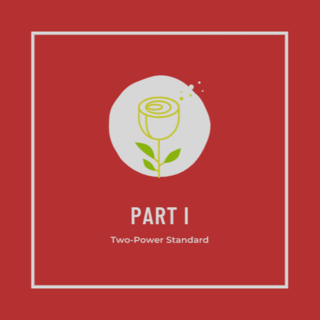
The Rule of Law of the Six Introductory Principles has its origin in Yohannes and is the most fundamental building block of the Nineteen Countries constitutional system.[2] It depends on the unspoken agreement between the individual and the state—the subject and their ruler. They must sacrifice some rights and accept certain responsibilities. The individual protected by the state must be willing to sacrifice a certain degree of freedom in the name of law. In return, the state must exercise restraint and act in conformity with existing laws.
The development of the Six Introductory Principles can be traced back to the earliest mention of the rule of law by the Alexandrian jury constituted ad hoc by Frederick William I in 1509. They were local villagers summoned by the king to settle a land reform dispute between two influential property owners in the village of Altenmark. A party who won the agreements of 11 villagers would win. Its trace can still be seen today, where liability is decided by 11 citizens of the realm, or in the case of a grand jury, where a party must win the support of 11 jury members out of 21.[3]
Limited Separation of Powers
According to Governance of the Nineteen Countries (HM The Queen, 1998), there are three branches of the Realm Government: the Executive, the Legislative, and the Judiciary. The Realm Government, headed by the Chancellor of the Nineteen Countries and supervised by the Yohannesian Emperor, is the face of the executive branch. The Realm Parliament, assembled by the Electoral College and headed by the Speaker, is the face of the legislative branch. The Justices of the Peace, appointed by the Emperor and supervised by the Realm Parliament, is the face of the judiciary branch.
In organisational manners, each of these three branches has a separate existence with their own traditions and methods of recruitment. There is a separation of personnel, with only one contradictory element to that statement: the executive is a part of the legislature. The Realm Parliament includes both the Chancellor and the (Electoral and Listed) Members. Further, cabinet members, or Ministers of the Realm, are members of both the executive and the legislature. The executive and the legislative branches have their own functions for the most part, with only some overlapping roles and activities. One example of this is the way in which the executive includes itself in legislative actions (such as the involvement of select committees) both to represent itself as an administrator, but also as part of the legislative body at the same time. The Justices of the Peace are also included in statute law review.
The Three Executive
The Executive Branch, representing the Nineteen Countries in Yohannes overseas, to the countries of the international community, to the World Assembly, and to entities of non-nation-state nature, is divided into three bodies. The first is the Head of State. She or he is the Emperor, Empress, or Imperial Monarch. The words are interchangeable in Yohannes, unlike overseas, with "Emperor" often used for a female monarch (e.g. Her Majesty Garnet Til Alexandros the 17th Yohannesian Emperor). The second is the Chancellor, leading the Ministers of the Realm, who, together with their Ministers, are elected parliamentary members—they are voted into office by registered voters from the general electorates. Traditionally, the Ministers of the Realm are the advisers of the Head of State. However, in modern day Yohannes, that point has been completely ignored—since the Second Industrial Growth era (1850–1900), the Emperor has been the supervisor, the Chancellor the executive catalyst, and the Ministers of the Realm the executors of laws.
It has to be noted that even today, the Emperor has very extensive powers, on paper, but they cannot be exercised freely—and in the case that this tradition is broken, the unfavourable reactions of the people, which include those elected Members of Parliament, would convince the offending incumbent to immediately submit themself to public scrutiny or, worse still, resign. The Ministries, further, are not static in nature. Election results and the resulting interparty negotiations can create new ministries, delete existing ministries, or reform more than one to become one, within reason (e.g. budget crisis means the Ministry of Trade and the Ministry of Industry will become one). The Ministry is an aggregate which meets as part of the Cabinet of the Nineteen Countries. The Chancellor, heading this cabinet, enjoys preeminent position as Head of Government of the Nineteen Countries. Only the Emperor can override the Chancellor’s authority as a reviewer of the Chancellor’s actions.
In theory, the Ministers must act professionally for Yohannes the nation-state, regardless of their personal political allegiances; should be non-political in their bureaucratic orientation; and should be neutral in the context of inter-party interactions. Realistically, however, sometimes boundaries are broken, much to the chagrin of political pundits and middle ground voters. The Ministries must follow the orders of their Ministers, and must help the Ministers of the Realm to turn laws into reality, on the ground, everyday across the Nineteen Countries.
The Will of Parliament
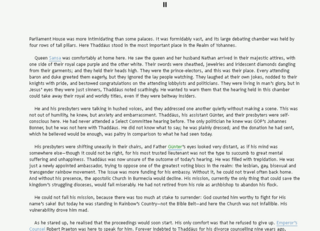
The Will of Parliament is a concept taken from the foreign Constitution of Maxtopia.[7] The concept, well-known and widely seen in many other countries, means that an Act of the Realm supersedes and is prioritised above all other public and private entities in the Nineteen Countries. The Act of the Realm is not limited by any legal barriers, and under the Realm Nineteen Countries Amendment Act 1970, the Realm Parliament received full authorities as the editor and eraser of existing Acts. The Justices of the Peace cannot eradicate or make unlawful the Will of Parliament, once it has passed the tables of Parliament. The Justices of the Peace of the Realm can, however, overrule the Will of Parliament, if they believe that a documented law has not followed proper procedures.
Finally, it must also be taken into consideration that in the Nineteen Countries, the Will of Parliament to impose its Act does not mean that Parliament, by itself, is the ultimate bearer of justice. The executive and the legislature must be able and willing to work together effectively. Since the executive body by legal acknowledgement (section 103 of the Realm Nineteen Countries Amendment Act 1970), and by tradition (since the Second Industrial Growth era), has practically all the powers over non-ministerial, elected Electoral and Listed Members, the Will of Parliament can be abused by the executive body to assert its will over the legislative body, insofar as consent has already been given by the majority support of Parliament’s members.
The Rule of Law
According to Governance of the Nineteen Countries (HM The Queen, 1998), the principles of the Rule of Law and its existence must divide the international community of countries into two: the civilised nation-state, and those of the uncivilised nation-state. The Rule of Law describes a situation whereby the action of the executive must be executed throughout the realm in accordance with existing laws passed in Parliament verbatim. The Justices of the Peace, leading the higher courts of the realm, must have the power to examine, without obstruction, diversion or corruption, the legality of each and every one of the Acts passed by Parliament, the action of cabinet members and their ministries in relation to the Act, and the action of state-sponsored bodies in relation to the Act. The Justices of the Peace must not, however, make legally null the application of an Act, once it has followed proper procedures, word for word, and recorded by the Gazette of the Realm.
Responsibility of a Realm Ministry
The responsibility of a Realm Ministry can be divided into three: support of the majority, responsibility before the majority, and leader of their assembly. The first, support of the majority, means the support of majority Electoral and Listed Members in Parliament, supervised by the Electoral College, will be required for a ministry to successfully carry its task. Another reason is because the head of a ministry must come from Parliament itself. The second, responsibility before the majority, means a ministry is accountable for the action of every department or body acting on its behalf. The minister, as head of that ministry, must defend her or himself, before Members of the opposing political parties in Parliament, if they are to be required for an Act of the Realm to be legislated into reality.
All public expenditure and related materials must be accredited by the Justices of the Peace. The lack of such approval means the minister, as head of the ministry, will not be able to use the material to defend their position. A minister is, in essence, the leader of their pack, which is the third point of responsibility. They will be responsible, before Parliament, for all publicly aired views by government and state sponsored officials and by their subordinates in their ministry and its associated bodies. The Responsibility of a Realm Ministry mean the legislature will have the power to judge and review a ministerial body of the realm. It can, however, be abused by some ministers of the realm, for the confidential nature of them speaking before Parliament means that members of the public will not know about the information presented by these ministers that may affect them.
The Opposing Forces

She or he elected and chosen as the public face of the non-governing largest party in Parliament, or the second largest party in Yohannes, is given the title of Realm Head of Opposition to speak on behalf of the Opposing Forces. This inherited practice was handed down from the early days of politics in Yohannes before the Second Industrial Growth era, when the state of political party administration was poor compared to today's standards. Then, more than one person, sometimes up to five, spoke on behalf of the opposing parties in Parliament against the governing parties. The need for practicality and precedents slowly reduced the number of representatives to just one. The Realm Head of Opposition has special privileges not given to other Electoral and Listed Members in Parliament—in effect, making them almost equal in status to the Chancellor of the day.
Just like the Chancellor, the Realm Head of Opposition can speak on behalf of the Nineteen Countries overseas, although not officially, to show the other side of public opinion about certain foreign policy issues happening outside Yohannes. The title is an ad hoc creation; it was not recorded by any previous Act of the Realm, nor was it recorded by wills. It is a position founded entirely out of necessity, as time progressed since the independence of the Nineteen Countries in Yohannes from Yanitaria in Greater Dienstad. It shows how parliamentary practice and the nature of politics in Yohannes are continually moving, within reason and within the bounds of existing conventions. If future political situation in the country allows it, there may well be more than one Head of the Opposition again.
The Realm Head of Opposition has the fourth-highest salary in Parliament assembled, behind only the Chancellor, the Minister of Foreign Affairs, and the Minister of Economy, Industry and Trade; in that order. The party they belong to is known as the Leading Party of the Opposition, and Electoral and Listed Members of Parliament and Elected Collegians of the Nineteen Countries from their party are seated opposite the governing party, next to the Speaker of the Realm Parliament. The Speaker has the power to remove an existing Head of Opposition, if two or more non-governing parties have clear leading power to represent the opposition; that is, from equal number of popular votes. The Head of the Opposition enjoys all the privileges the Chancellor has, with the exception of the tools of government; and they are briefed on important nation-state matters concerning the Nineteen Countries, such as its international trade and commerce, intelligence, and so on.
Sanctioned amendments
The Rule of Law has nine sanctioned amendments.
First Amendment—Investigation and Review

All bodies corporate and persons susceptible to investigation and review by Yohannes the nation-state must be emphasised for the purposes of constitutional clarity. They are as follows:
- The working groups of Parliament and the Realm, in accordance with the third introductory principle of the Will of Parliament;
- The heads of government departments, in accordance with the fifth introductory principle of Responsibility of a Realm Ministry;
- The incorporated bodies, in accordance with the Nation State Companies Act 1943;
- The Inferior courts and the statutory tribunals, in accordance with the Justices of the Peace Act 1787;
- The local and regional authorities, in accordance with the Local and Regional Authority Corporation Act 1914;
- The Ministers of the Realm, in accordance with the second introductory principle of the Three Executive;
- The private sector organisations of the Realm, in accordance with the fourth introductory principle of the Rule of Law; and
- The unincorporated public bodies, in accordance with the Realm Services Act 1921.
Entrusted with powers in some respects of a public nature, a large number of decisions are subject to government review at the federal level. The Justices of the Peace scrutinise the exercise of any such rights, powers and privileges. This power is not considered as material or general but of the specific nature, whether by statute or by prerogative. Parliament is the primary review authority, in consultation with the Electoral College. Reserved for cases of imperative public importance, the Justices of the Peace act as secondary authority.
Second Amendment—Economy and Industry
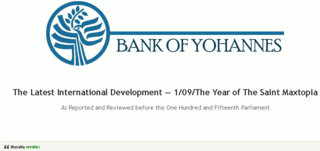
With the independence of the Nineteen Countries, the establishment of the Electoral College, the ascendancy of Parliament and the foundation of the Justices of the Peace, with the national objectives: the modernisation and industrialisation of the independent, united states in Yohannes, and to reach the same quality or standard as the economically and technologically superior countries of the Western world, there must be created a fairly uniform coinage; a commercial code for industry and trade; a government bank and a consortium of heavy industry;[11] the emphasis on freedom and free trade with the West and those civilised countries of the Orient, such as Meiji Japan; the abolition of inherited representation of the landed gentry in local and regional councils of the united states in Yohannes; the liberalisation of the power of any company and equal body of commerce of the realm to borrow, raise, or secure payment of currency in such manner as the body may think fit; the legislative authority of Parliament in the field of tariffs and commercial policies and economic and trade matters, such as land and maritime traffic and transportation infrastructure, weights and measures, consular rights and sub-state diplomacy; and other matters important to the economic well-being of these united states in Yohannes.
Fourth Amendment—Financial Security
The guarantee of financial security is very important to ensuring the independence of the judicature and the everyday machinery of government. Remuneration for judges, public officers, and other non-partisan constituents of nation-state machinery must not fall beneath a minimum level that could be perceived as exposing them to economic manipulation, political obstruction and tempting corruption. This amendment ordains that there must be no reduction of salary for any such contributing constituent of nation-state machinery. This amendment further strengthens that guarantee by placing the salaries of any such contributing constituent above the jurisdictions of all future commissions—except the Administrative Financial Security Commission of the Nineteen Countries, answerable to the Justices of the Peace, but having the right to protection by the Office of the President of the Electoral College.
Indirect and non-discriminatory reductions in salaries of the contributing constituents are allowed, in so far as they will not breach the limitation imposed by the Commission—for instance, inflation, as they also affect the public at large. Another example is the decision of the government to directly increase revenues by increasing tax rates, as they will affect all persons of the realm.
Sixth Amendment—Law of the Sea
The Law of the Sea encompasses the laws regulating navigation and commerce of the territorial sea, continental shelf, and exclusive zone of trade and commerce of the Nineteen Countries. In Unity Law, the Law of the Sea is to be found primarily in statutes and in the decisions of the Justices of the Peace. For the purposes of historical inquiry, the Law of the Sea was derived from the admiralty and maritime jurisdictions of such bodies of law in Common Law countries.
The Law of the Sea states that as an island country, the seas surrounding the Nineteen Countries must be protected by ships of the Navy, for the purposes of nation-state protection. All undeclared ships of a military nature found in the territorial sea of the Nineteen Countries must be seized of jurisdiction; arrested, confronted, and be seized permanently as property of the Nineteen countries, from the date of transfer of jurisdiction by the Admiralty Court of the Justices of the Peace.

A ship is defined as including any description of vessel used in navigation. The non-exclusive definition of ship can be contrasted with other statutory definitions applicable in the context of the limitation of liability for claims relating to ships, and the registration of such ships. The question whether a particular object meets the definition of ship is a matter of jurisdiction. The question can arise in relation to ships withdrawn from navigation and ships used for alternative purpose; ships under construction or repair; and objects which operate at sea but which have, as their primary purpose, something other than navigation in mind.
For the purposes of bottomry, jurisdiction must still be applied. The same must also be applied for the purposes of respondentia. Under ancient bonds of the kind, the lender took the risks of the ship being lost—in this case, to the jurisdiction of the Nineteen Countries. Any future charges and mortgages must also be treated in kind.
Tools of government
According to the Halsten Law Review's "The Rule of Law Abridged," the tools of government are the principles and practices of public administration in a sovereign country.
Acts and bills

Legislation is proposed into Parliament’s chamber in the form of bills. Bills may be nation-state bills, local and regional bills, or citizen bills. Nation-state bills are bills which affect the entire jurisdiction of the Nineteen Countries. Local and regional bills are bills which affect only a particular local or regional government in Yohannes. Citizen bills are bills which affect only a particular entity or individual or group of entities or individuals. Bills introduced by a Minister of the Realm on behalf of the Executive Council are formally called domestic nation-state issues bills. Bills introduced by individual members are formally called individual minor bills. Individual minor bills rarely pass, and are usually introduced only to stimulate debate and discussion on controversial or contemporary issues. However, a few minor bills have passed into law, such as the Legalised Homosexuality Act 1945 and the International Cultural and Education Exchange Act 1971.
An Act of Parliament and Statute of the Realm, shortened "Act of the Realm," is a bill which has become law. An Act comes into force on its declaration day, unless written otherwise. Each Act starts with a description and long title summarising its purpose—they are included as the Act's constitutional title, but in practice the Act itself is referred to by the official short title given before its introduction. For instance, "An Act to amend the Food Safety and Compliance Act, to create the Food and Energy Institute of Technology, and to define its function and powers of 1980" (long title) becomes the "Food Safety and Compliance Amendment Act 1980." The same practice is applied for nation-state Acts, local and regional Acts and citizen Acts as they are also done for nation-state bills, local and regional bills and citizen bills.
Consolidated accounts and estimates
Parliament administers the voting of money for government at the federal level—that is, the executive council as led by the Chancellor. Parliament also administers the voting of the executive council money, and the careful examination and inspection of public expenditure. For this reason, the details of current and projected expenditure must be published so they can be evaluated and debated.
Every year the Minister of the Treasury and Wealth Fund provides a Budget to Parliament. The Budget is both a policy statement and an introduction to the financial statement of the executive council's income and expenditure; its financial proposals for the following year and its fundamental debt. The budget is accompanied by Estimates of Appropriations (shortened Appropriations), in which organisations of the executive council which are funded by the taxpayers of the realm and the public purse (e.g. capital gains tax, tariff) outline the money they will need for the approaching year. Their Appropriations give details of the previous year's expenditure, and since the turn of the century, they have included a brief summary or short-form spoken account. The Budget and Appropriations are the result of the long debate and discussion undertaken by the Three Executive and the ruling party or coalition's caucus. Under the reforms implemented by the Government Budget Transparency Amendment Act 1997, ministerial corporate plans and performance agreements between Ministers of the Realm and chief executives of the respective executive council organisations falling within their areas of responsibility have been integrated into the budget cycle every year.
Ministers of the Realm and their chief executives review performance from the previous year, develop plans and resource requirements for the next year, and submit this information to the Office of the Minister of the Treasury and Wealth Fund, along with strategic plans and fiscal outlook paper for both the Minister of the Treasury and Wealth Fund and the Minister of Economy, Industry and Trade. The executive council, led by the Chancellor, reviews this and other information and tries to find other strategies before deciding on its official fiscal priorities. Taking this into consideration, the chief executives can release their corporate plans, performance agreements, and appropriations; and finally, the ministerial half-yearly financial statements which will be compiled, audited and tabled in Parliament’s chamber. After another assessment by the executive council, the corporate plans and appropriations can be amended, with the latter included into the first Appropriation Bill for the fiscal year—that is, the Budget itself. This must be tabled in Parliament by the end of the second quarter of that fiscal year (e.g. Estimates of Appropriations FY 2018-19).

The Budget and Appropriations are then debated in Parliament. The Select Committees on Ways and Means and Finance and Expenditure are tasked with carefully examining and assessing the Appropriations. Prior to the enactment of the Imperial Nineteen Countries Amendment Act 1970, two weeks would be given exclusively for the Appropriations debate, but the changes brought into force since then have reduced that to only one, with the chance to debate the performance and requirements of individual executive council organisations be given later.
After the passing of the Appropriation Act, which sanctions all expenditure by the government, the Ministers of the Realm can compile performance agreements with their chief executives. Thereafter, ministerial corporate plans are released for member of the public to digest. At some later stage, ministerial annual reports for the previous year will be prepared, audited and tabled in Parliament’s chamber. The select committees then examine the performance of the individual Ministries of the Realm and the executive council organisations within their areas of responsibility. The Committee of the Whole Parliament will then assemble for one week to start the annual budget analysis debate. Ministers of the Realm and their chief executives can report about the objectives of their agencies and organisations next year.
Electoral debates
The Electoral Debates' Hansard—commonly shortened to Hansard, after Matthäus Fehr von und zu Hansard—is Parliament's publication which records nation-state legislative activities. Administered by Archives Yohannes, it publishes official speeches and debates in the legislature. Every year since 1871, many documents have been tabled in Parliament’s debating chamber for the consideration of its members. The definition of "tabled" is just that: the papers so chosen are laid on the large table of the debating chamber, in front of the Speaker’s chair.
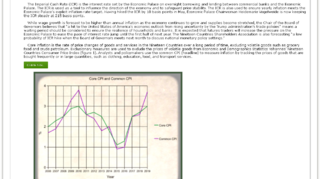
Tabled documents include almost every report made by executive council departments and some statutory bodies. They also include the reports of foreign diplomats and the World Assembly's International Incidents authors; international agreements, conventions and developments which could affect Yohannes' overseas investment and trade; financial statements and economic reports, including budgets, expenditure estimates and government accounts; and legislative instruments and commission, quango and select committee reports. Biennially, a few parliamentary orders are printed, though in practice, most have already been published online, so this is simply a formality. Collectively, Parliament's official papers are known as Annual Report to Parliament (ARP). The Parliament House Administration Publishing Office is the agency responsible for selling these official papers to members of the public.
The reports of almost every executive council organisation are published in the ARP, though over the years there have been some anomalies—the Ministry of Continental Security does not publish any report, for obvious reasons, although a report is published about government surveillance and interception warrants; the Office of Embassy and Consulate Programme did not publish its replies before the turn of the century; the now defunct Nineteen Countries Guild of Commerce, Industry and Trade did not publish its reports, unlike its successor the Chambers of Industry and Commerce Yohannes; and finally, the Bank of Yohannes did not publish its Monetary Target Consensus until the second half of the 20th century.
Parliament
The Limited Separation of Powers, which established the Electoral College in 1781, and thus created the Parliament of the Nineteen Countries, used the term "Imperial Parliament" rather than "Parliament." Parliament and "Realm Parliament," however, soon came into popular usage, and in latter years especially have been used as a lazy shorthand term for both the institutions of the Electoral College and the Realm (archaic: "Imperial") Parliament. Not until the First Amendment came into force on 5 August 1861 did "Parliament" also become an official constitutional term.
Parliament today, broadly speaking, consists of the Assembly of Electors in the Nineteen Countries (Collegian Electors of the Nation State) and the Realm Parliament (Members of the Realm Parliament) itself. The role of the President of the Electoral College, who is also the elected Yohannesian Emperor at the same time, is purely formal. She or he is constantly absent from the Chamber of Electors to fulfill their executive duties and obligations as chief supervisor of the Executive Council. The real business of Parliament is carried out by the elected Realm Parliament, with members of the Electoral College themselves often attending the Realm Parliament's meetings to voice their views on day-to-day state matters. The functions of Parliament are to enact laws; to provide an Executive Council (i.e. federal government); to vote for departmental Appropriations (e.g. supplying money); and to examine the way the money is spent. Most importantly, Parliament also serves as the highest debating chamber in the land on public issues, and has the ultimate authority to redress citizens' grievances on petitions.
The Justices of the Peace
The Constitution of the Justice of the Peace Institution was established by the passing of the Justices of the Peace Act 1787. Tabled by inter-party consensus of the first Parliament and Electoral College, the purpose of the act was to create a modern judiciary branch influenced by Western political and legal ideas, so that the Nineteen Countries could develop itself to become a modern, industrialised nation-state. The foundation and subsequent development of the Justices of the Peace ultimately made Yohannes an independent civilised country, with its own legal history and unique tradition. It is the second oldest piece of legislation in the Nineteen Countries, entering the chamber of Parliament after the Foreign Mission Act 1787.
The judicature is the three founding institutions of Yohannes, and is directly or indirectly cited by many Acts of different persuasions, from the main body of the original Electoral Act 1790 to the express statutory provisions of the modern Gender, LGBT, Racial and Religious Minority Act 2016.
References
- ↑ Goldwert, A. (2020). The Servant of God. In Yohannesian Peace (p. 4). Royal Alexandria, Yohannes: World Assembly Central Library Complex (WACLC).
- ↑ Out-of-Character (OOC) information: Based on my real-life work, i.e. taken from my academic work and other authors cited. Feel free to copy anything for your fictional country on NationStates, but don't take information from here for non-RP real-life (e.g. Wikipedia article) sentences; yes this happened and yes I will know.
- ↑ Chua-Küchler, J. (2019, June 18). Know Your History—by specialist litigation and arbitration lawyer Jennifer Chua-Küchler. Financial Diary, p. 5.
- ↑ Electoral Debates' Hansard. (2018, September 25). Vote2018: First Leaders' Debate. Royal Alexandria, Yohannes: Parliament Channel.
- ↑ Electoral Debates' Hansard. (2018, January 19). Election 2018: Special Coverage. Royal Alexandria, Yohannes: Parliament Channel.
- ↑ University of Yohannes Vice-Chancellor. (2019). Money for Christ. In The Archbishop and His Mission (p. 7). Royal Alexandria, Yohannes: World Assembly Universal Library Coalition (ULC).
- ↑ Maxtopia. (2015). In NSWiki, the NationStates Encyclopedia. Retrieved November 23, 2019, from http://nswiki.org/index.php?title=Maxtopia and https://maxbarry.com/
- ↑ Office of Embassy and Consulate Programme. (2019). Physical and Intellectual Disability Day—Administration and Nation-building Special Coverage. Retrieved from https://www.nationstates.net/page=dispatch/id=1174631
- ↑ Office of Private Secretary. (2019). Queen Sansa in an Age of Wolves—Gholgoth. Royal Alexandria, Yohannes: Parliament House Administration Publishing Office (PHO).
- ↑ Bank of Yohannes. (2020). About our institution. Retrieved from https://forum.nationstates.net/viewtopic.php?p=3515197#p3515197
- ↑ VMK Defence & Steel Works. (2018). Searched query: Media Contact. Retrieved from https://forum.nationstates.net/search.php?keywords=Media+Contact&t=105528&sf=msgonly&sid=2c803b146a95313e0ac6152cb9079173
- ↑ Higher Education Amendment Bill 2017: Inter-Party Discussion, Domestic Nation State Issues. (2017). Retrieved from https://forum.nationstates.net/viewtopic.php?p=32848258#p32848258
- ↑ Möller Barristers and Solicitors. (2019). Smart Aerospace Composites (Submission No. 174). Royal Alexandria, Yohannes: PHO.
- ↑ Ministry of the Treasury and Wealth Fund. (2019). Monthly Report to Parliament—June Fiscal Quarter 2019 Economic Summary. Royal Alexandria, Yohannes: WACLC.
